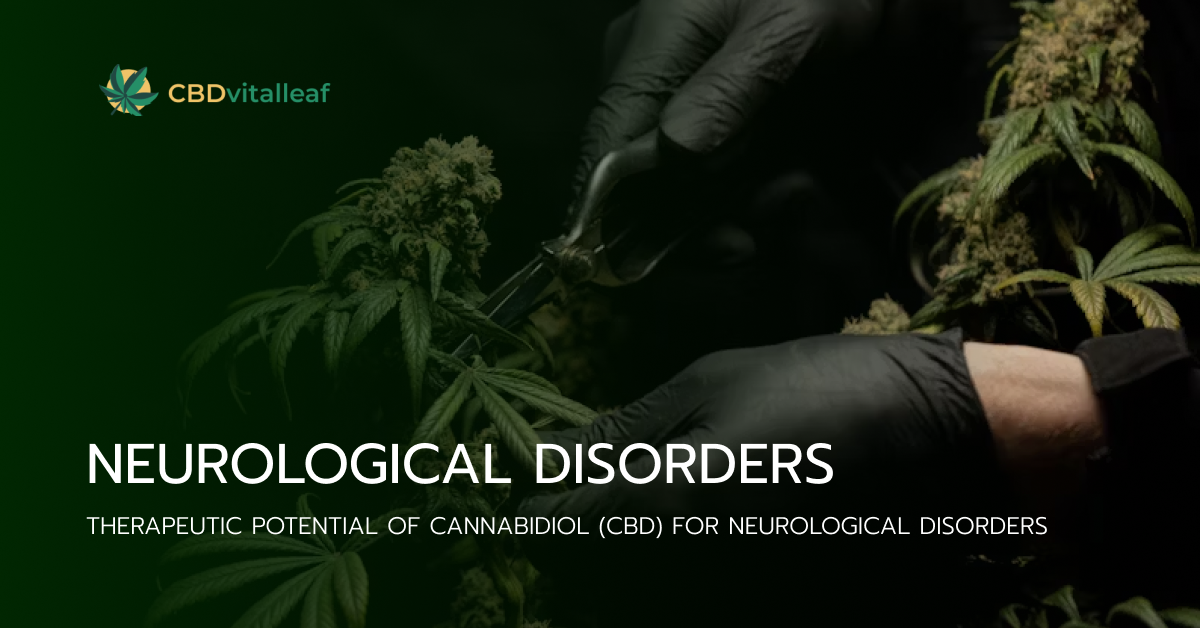Neurological disorders, encompassing conditions like epilepsy, Parkinson’s disease, Alzheimer’s disease, and multiple sclerosis, impose a significant burden on individuals and healthcare systems worldwide. These disorders affect the brain, spinal cord, and peripheral nerves, leading to cognitive, motor, and emotional impairments. Traditional treatments often offer limited relief and come with side effects.
Cannabidiol (CBD), a non-psychoactive compound derived from the Cannabis sativa plant, has emerged as a promising alternative for managing neurological disorders. Unlike tetrahydrocannabinol (THC), CBD does not produce the “high” associated with cannabis. Its therapeutic effects stem from its interactions with the body’s endocannabinoid system (ECS), influencing neuroprotection, inflammation, and oxidative stress.
The Science Behind CBD
The ECS plays a vital role in maintaining bodily balance. It comprises cannabinoid receptors (CB1 and CB2), endocannabinoids, and enzymes. CBD interacts with various receptors and systems:
- CB1 Receptors: Found in the brain and central nervous system, these regulate mood, memory, and motor control.
- CB2 Receptors: Predominantly in immune cells, these modulate inflammation.
- Other Targets: CBD also interacts with serotonin, dopamine, and transient receptor potential (TRP) channels, contributing to its broad therapeutic effects.
Notably, CBD enhances the levels of anandamide, a naturally occurring compound that plays a role in pain and mood regulation.
Therapeutic Benefits of CBD in Neurological Disorders
Epilepsy
Epilepsy, characterized by recurrent seizures, affects over 50 million people worldwide. Traditional treatments fail in 30% of cases. Clinical trials have demonstrated that CBD reduces seizure frequency by 37-42% in treatment-resistant forms like Dravet syndrome and Lennox-Gastaut syndrome. In 2018, the FDA approved Epidiolex, a CBD-based medication, for specific epilepsy conditions.
Parkinson’s Disease (PD)
PD is a neurodegenerative disorder leading to motor dysfunction. Preclinical studies revealed CBD’s neuroprotective and antioxidant properties. In human trials, patients reported a 17.8% improvement in symptoms like tremors and sleep disturbances after 15 days of CBD treatment.
Alzheimer’s Disease (AD)
AD involves cognitive decline due to amyloid plaques and neurofibrillary tangles. Animal studies showed that CBD reduced inflammation, oxidative stress, and amyloid buildup, improving memory and cognition. However, human trials are still needed to validate these findings.
Multiple Sclerosis (MS)
MS involves immune-mediated damage to the nervous system, leading to muscle spasticity and pain. CBD has shown effectiveness in reducing muscle stiffness and improving mobility.
Anxiety and PTSD
CBD’s interaction with serotonin receptors underpins its anxiolytic effects. Studies report a significant reduction in anxiety symptoms after administering CBD, even in stressful situations like public speaking.
Other Conditions
- Neuropathic Pain: CBD reduces pain sensitivity and inflammation.
- Huntington’s Disease: Preliminary studies show potential but highlight the need for optimized dosing.
- Schizophrenia: CBD may alleviate psychotic symptoms by modulating dopamine receptors.
Effects of CBD on Neurological Disorders
| Neurological Disorder | CBD Treatment | Study Design | Outcomes |
|---|---|---|---|
| Epilepsy | 10-50 mg/kg/day | Randomized Controlled Trials (RCTs) | Seizure reduction by 37-84%; FDA-approved for Dravet and Lennox-Gastaut syndromes. |
| Parkinson’s Disease | 20-300 mg/day | Open-label and RCTs | Improved motor symptoms, reduced tremors, better sleep, but mixed results in trials. |
| Alzheimer’s Disease | 2-20 mg/kg (animal studies) | Preclinical (rodent models) | Reduced neuroinflammation, amyloid plaques, and oxidative stress; improved cognition. |
| Multiple Sclerosis | 10 mg/day (capsules) | RCTs | Decreased muscle spasticity and pain. |
| Anxiety Disorders | 300-600 mg/day | Human studies | Reduced anxiety symptoms, improved social interactions. |
| Neuropathic Pain | 5-20 mg/kg (injections) | Animal models | Lowered pain sensitivity and inflammation. |
| Schizophrenia | 600 mg/day | RCTs | Reduced psychotic symptoms, potential as adjunctive therapy. |
| Huntington’s Disease | 10 mg/kg/day | Early Clinical Studies | No significant improvement; highlights need for optimized dosing. |
Mechanisms of Action
CBD’s multifaceted effects are linked to its interactions with various biological systems:
- Anti-inflammatory: CBD reduces pro-inflammatory cytokines like IL-1 and IL-6.
- Antioxidant: It neutralizes oxidative stress, protecting neurons.
- Neuroprotection: CBD enhances mitochondrial function and reduces excitotoxicity, a process that damages neurons.
- Receptor Modulation: CBD affects serotonin, adenosine, and TRP channels, contributing to its broad therapeutic profile.
Safety and Challenges
CBD is generally well-tolerated, with mild side effects like fatigue and appetite changes. However, it can interact with certain medications, necessitating consultation with healthcare professionals.
Key challenges include:
- Optimal Dosing: Studies highlight variability in effective doses, ranging from 10 mg/day for anxiety to 50 mg/kg/day for epilepsy.
- Regulatory Hurdles: Despite growing acceptance, the legal status of CBD varies across regions.
- Long-term Effects: More research is needed to understand CBD’s impact over prolonged use.
Conclusion
CBD holds immense promise as a therapeutic agent for neurological disorders. Its anti-inflammatory, neuroprotective, and anxiolytic properties provide hope for patients with limited treatment options. While challenges remain, ongoing research aims to uncover its full potential and establish evidence-based guidelines.
By integrating CBD into clinical practice, we could revolutionize the management of neurological conditions, offering patients a safer and more effective alternative.







